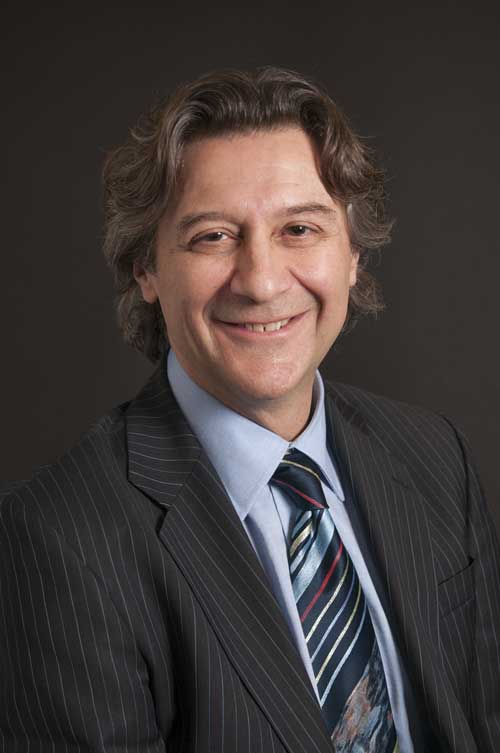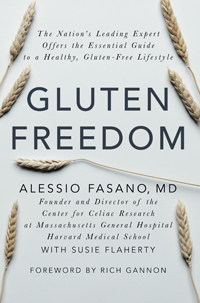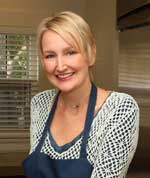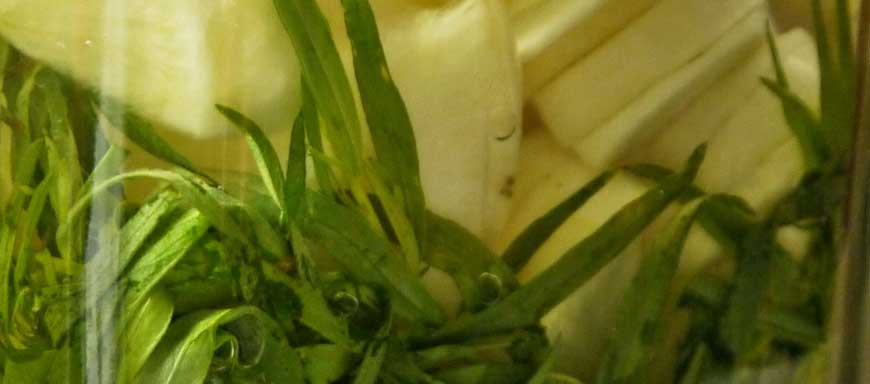Interview by Elisabeth Veltman
 Alessio Fasano, MDIt was a true privilege to once again speak with Dr. Alessio Fasano, a pioneer in the research and treatment of celiac disease, other gluten related disorders, and autoimmunity. Dr. Fasano is the Chief of Pediatric Gastroenterology and Nutrition at Massachusetts General Hospital, and is the Director of the Center for Celiac Research, which he founded in 1996. He is also one of the most beloved figures in the gluten-free and celiac community. His passion for his work and his love for people are absolutely palpable. He is tireless and uses a rare combination of science and art in the way he approaches his research. He can break down a very complex subject into picturesque language, and is an absolute joy to interview.
Alessio Fasano, MDIt was a true privilege to once again speak with Dr. Alessio Fasano, a pioneer in the research and treatment of celiac disease, other gluten related disorders, and autoimmunity. Dr. Fasano is the Chief of Pediatric Gastroenterology and Nutrition at Massachusetts General Hospital, and is the Director of the Center for Celiac Research, which he founded in 1996. He is also one of the most beloved figures in the gluten-free and celiac community. His passion for his work and his love for people are absolutely palpable. He is tireless and uses a rare combination of science and art in the way he approaches his research. He can break down a very complex subject into picturesque language, and is an absolute joy to interview.
THE IMPORTANCE OF DR. FASANO’S RESEARCH
My first interview with Dr. Fasano was in December of 2011, after he and his research team discovered a “new food allergy” called gluten sensitivity in April of that year. During the interview, one of the most interesting and shocking facts he discussed was that no one has the ability to digest “gluten,” a term that was just becoming a household word at the time. In that interview, he offered some of the reasons why so many people are affected by the “gliadin” class of proteins found in gluten-based grains like wheat, rye, barley, and other grains within the grass genus Triticum (read more). Dr. Fasano became recognized around the world when he published a study on the dramatic rise of celiac disease in the 2003 Annals of Medicine, and even before this when he discovered “zonulin”, a protein in the human body that regulates the permeability of the body’s tissues, including the intestine. Zonulin causes the intestinal wall to open and close as required by the body to keep nutrients in and harmful stuff out. Too much zonulin seems to cause the intestinal walls to stay open, allowing other allergens and substances into the body, alerting the immune system, and giving credence to the term, “leaky gut.” This discovery led researchers to an interesting pattern: people in the acute stages of celiac disease have increased zonulin levels. His research links increased zonulin levels to the development of celiac as well as other autoimmune diseases. Additionally, since celiac disease is the only autoimmune disease where a clear trigger (gluten) is known, Dr. Fasano’s research will benefit all autoimmune research, as it will help scientists find the triggers to diseases like type 1 diabetes, multiple sclerosis, and rheumatoid arthritis and could pave the way to a cure.
Read about his new study here: How to predict the onset of celiac disease & how gut bacteria influences autoimmunity.
HIS NEW BOOK
 Dr. Fasano has been interviewed and quoted in hundreds of publications including The New York Times, The Washington Post, NPR, Bloomberg News, and the The Los Angeles Times; and has been featured on television on shows like “Good Morning America.”
Dr. Fasano has been interviewed and quoted in hundreds of publications including The New York Times, The Washington Post, NPR, Bloomberg News, and the The Los Angeles Times; and has been featured on television on shows like “Good Morning America.”
I was very excited to learn about his new book called, “Gluten Freedom” which was published this week, and authored with the help of writer Susie Flaherty. His book will help dispel some of the myths that have arisen around gluten related disorders. These myths and misunderstandings have caused quite a stir (in other words: argument) in the gluten-free community and in the media, so it will be very interesting to see what Dr. Fasano has to say. The book will also discuss some of the exciting research that he and his team have done and are doing, including studies on the microbiome in the gut and how that protects us from disease, and the gut’s relationship to the brain. The book is available now on amazon.com.
THE INTERVIEW
Our interview helps answer some of the questions and concerns that The Tender Foodie receives from readers about the confusion in celiac diagnosis, the importance of early diagnosis, a new term called “the gluten sensitivity spectrum”, the dangers of cheating on your diet, the relationship between gluten and autism, and the propensity for developing autoimmune disease because of gluten sensitivity or celiac disease. He also gives a few more highlights into the delicious morsels of information that we can find in his book.
Celiac Testing
TENDER FOODIE: When we last spoke two and a half years ago, we discussed how to get tested for celiac disease. You had mentioned that 4 out of 5 markers is the new standard for a celiac diagnosis, and that following this standard might help avoid a biopsy. Has anything changed since then?
DR. FASANO: At that time we were discussing a proposal to the medical community that we change the existing criteria to the 4 out of 5 marker algorithm.
We had decided that we needed to invent an algorithm that addressed patients who were exceptions in the celiac community. In reality, 80% of patients will fulfill the old criteria, but there were many patients who fell through the cracks when it came to diagnosis. One year after we spoke last, this new algorithm (the 4 out of 5 markers) became official in the European community and is now accepted worldwide. The method has been reviewed using an evidence-based method by the medical community at large.
NOTE: The method has been reviewed by: European Society of Pediatric Gastroenterology, Hepatology and Nutrition
TENDER FOODIE: Many of my readers are confused when they hear that the small intestinal biopsy is the “gold standard” for celiac diagnosis. They often ask – can there be a false negative? Can surgeons miss the part of the small intestine that is diseased, and therefore misdiagnose a patient?
DR. FASANO: We don’t call the biopsy the “gold standard” anymore. In fact, it is not the silver standard, nor even the copper standard! One main reason is that someone with celiac disease may have no damage to the small intestine. Not yet.
Two years ago, we didn’t have the strong screening tests that we do now.
NOTE: Watch this page for updates on testing for celiac disease and other food allergies and sensitivities.
TENDER FOODIE: Is celiac disease the only disease that can destroy the small intestine? If not, what else can?
DR. FASANO: Infections, viruses, and other inflammation can destroy the villi in the small intestine, too. In fact, for some of the people who have it, the AIDS virus can be quite devastating to the small intestine. Radiation from cancer treatments can also destroy the villi in the small intestine.
Young kids can have a list of diseases that can affect the gut, as well, damaging the small intestine, such as Cow’s milk (lactose) intolerance, parasitic infections, rotovirus, and autoimmune enteropathy.
CAN THE SMALL INTESTINE HEAL?
TENDER FOODIE: You’ve mentioned in past interviews that the small intestine can regenerate itself. Is there ever a point of no return? A point where the small intestine can no longer regenerate?
DR. FASANO: It takes 3-5 days for the small intestine to regenerate itself because within the blood system, we have the capability to continually regenerate. Intestinal cells constantly have to replace themselves, so this is a natural process that continually is happening.
There is no “point of no return.” The regenerative stem cells are in what we call “the crypts.” These are depressions in the small intestine where the stem cells live. These crypts actually expand themselves in people who have untreated celiac in order to create more regenerative cells. The crypts can get overwhelmed with demand in people who have untreated celiac.
In other words, it’s normal to have 100 cells die, and 100 cells regenerate on a regular basis. With celiac disease, cells die early, and stem cells can’t keep up with the regeneration process, so the crypts where the stem cells live expand to try to keep up with the need for new cells.
NOTE: In other words, if a person with celiac disease is not on a gluten-free diet, the crypts keep expanding to try to keep up with the die off of the villi, but cannot, so the destruction of the villi continues, and more damage to the small intestine occurs.
KEY DIFFERENCE BETWEEN CELIAC DISEASE & GLUTEN SENSITIVITY
TENDER FOODIE: In our last interview, you had mentioned that, “We don’t know all of the necessary genes to develop Celiac Disease; however, HLA DQ2 and/or DQ8 are absolutely necessary to develop the disease.”
How common is it to have a negative celiac panel, but a positive biopsy of the small intestine? And simply to clarify again, can you have a diagnosis of celiac disease without the aforementioned genes?
DR. FASANO: It is very rare to have celiac disease without these genes. That is why we have developed the 4 out of 5 markers. I mentioned before that the biopsy of the small intestine is no longer the gold standard, and can be avoided if the other 4 markers are present. But, if you have symptoms and a positive serology (antibodies are showing up in your blood test) in view of a negative HLA, you cannot avoid a biopsy, because at this point, we don’t know if the patient has gluten sensitivity or celiac disease. For instance, a negative serology (zero antibodies in the blood) plus symptoms (you get sick from consuming gluten) plus a negative HLA (the DQ2 / DQ8 genes are not present) is most likely gluten sensitivity and not celiac disease.
TENDER FOODIE: What about antibodies to the small intestine itself?
DR. FASANO: Positive or negative serology is just a test for the autoantibodies against tTG. There is an anti-enterocyte antibody test that is available that measures antibodies against your small intestine. However, it is not routinely performed and not widely available in labs. This condition is extremely rare.
CAN YOU CHEAT ON YOUR GLUTEN-FREE DIET?
TENDER FOODIE: Here is one of the most common questions that I receive often. Some readers who have been diagnosed with gluten sensitivity and even those with celiac disease have mentioned that they “cheat” on their diets and once in a while eat their favorite gluten-filled foods. I always shudder when I hear this. Can you tell us the rules on diet for both celiac and gluten sensitivity?
DR. FASANO: For people with celiac disease, cheating is an absolute NO-NO. it is like diabetes. If a diabetic skips insulin he/she will be in big trouble. The same for those with celiac disease, cheating is not an option.
For people with gluten sensitivity, we don’t know yet what cheating will do to the body. People appear to have different thresholds. Some people who are gluten sensitive (not celiac) can’t tolerate even a trace of gluten. Others people with gluten sensitivity (again, not celiac) can tolerate it occasionally. There appears to be a spectrum of tolerance for those with gluten sensitivity, so, unlike celiac, you need to be as strict as your body requires.
TENDER FOODIE: There are a lot of mom’s with celiac disease or with the disease in their families who would like to know if gluten can be transferred through breast milk?
DR. FASANO: Yes, gluten can be transferred via breast milk.
CELIAC, GLUTEN SENSITIVITY & OTHER AUTOIMMUNE DISEASES
TENDER FOODIE: Can you develop other autoimmune diseases either from untreated celiac disease or untreated gluten sensitivity? Also, have researchers gathered the statistics on whether or not DQ8 celiacs have a greater number of other autoimmune diseases than DQ2 or vice versa?
DR. FASANO: There are two schools of thought. Here are a couple of examples.
The first school says that if you have X number of genes that put you at risk for celiac, but are also born with Y # of genes for Hashimotos (a thyroid condition), for instance, then you are likely to get Hashimotos.
The 2nd school of thought says that untreated celiac disease leads to other autoimmune diseases, but you might reduce this risk of other autoimmune diseases if the celiac disease is caught early.
TENDER FOODIE: Do the celiac genes need to be expressed or triggered in order to develop other autoimmune diseases?
DR. FASANO: Here is another way to put it: Again, if you develop celiac disease and have complications from other autoimmune disorders, by default the celiac genes are expressed. So if you believe that other autoimmune disorders are due to untreated celiac disease, the answer would be yes, the genes must be triggered.
Here are some of the statistics for those with celiac disease who are at risk for other types of autoimmune diseases:
15/20% of celiacs are at risk for Hashimotos (A thyroid disease)
7-10% of celiacs are at risk for Diabetes
5% at risk for Auto Immune Hepatities Herpetiformas (A serious skin rash)
2-3% at risk for Sjögren's syndrome
For both of these schools of thought, you can’t make a celiac diagnosis without discovering intestinal damage. However, progressive thinkers say it doesn’t matter if the celiac is activated, or if the intestines are damaged or not, the person still could have celiac disease now and damage later in life. We need a third option where a diagnosis should come before the onset of celiac disease. We are more focused on prevention now than we have been in the past.
A study of children under the age of 2 in Sweden showed that the intestines of the celiac children who went on a gluten-free diet went back to normal, but those who were untreated -- almost all of these kids’ intestines had damage. The study suggests that there is an opportunity for early prevention because of early diagnosis.
Read about Dr. Fasano's new study on early diagnosis.
TENDER FOODIE: What about gluten sensitivity? Is that a precursor to autoimmune disease as well?
DR. FASANO: Gluten sensitivity is not an autoimmune disease, but I would not be shocked if we eventually find a link between it and autoimmune diseases.
NOTE: After the interview I followed up on this statement, "I would not be shocked to find a link between gluten sensitivity and autoimmune disease", as it is quite a powerful one, to confirm that this was exactly what he said. Dr. Fasano verified this statement.
WHAT IF YOU DON’T GET BETTER ON A GLUTEN-FREE DIET?
TENDER FOODIE: There are some people with celiac disease who do not seem to get better even when strictly adhering to a gluten-free diet. Could you talk about why?
DR. FASANO: Yes. There are some people who don’t respond to a gluten-free diet. This is a condition called Refractory Sprue. Refractory Sprue is defined by a persistent or recurrent malabsorptive symptoms and villous atrophy despite strict adherence to a gluten-free diet*. Most people with celiac disease do well on a gluten-free diet, but this is a small group who does not respond to strict adherence to it, and continue to have gut damage and symptoms. The immune system doesn’t even need to be instigated by gluten anymore in these patients. We also refer to these patients as “non-responsive celiacs” and this condition needs to be studied more carefully.
NOTE: In plain language, “malabsorption” refers to the inability of the small intestine to absorb nutrients because of damage to the villi. “Villous atrophy” simply means that the part of the small intestine that absorbs the nutrients (the intestinal villi) is being eroded or destroyed.
TENDER FOODIE: I’ve heard that you have a new diet that is successful for non-responsive celiac patients?
DR. FASANO: Yes! It’s called the Fasano Diet, although I wish they didn’t call it that!
TENDER FOODIE: Why not?
DR. FASANO: Oh, it was a team effort. It is a diet for everyone and not for me!
TENDER FOODIE: That’s funny, I love it! Tell me a little about this Fasano diet.
DR. FASANO: The patient is on the diet for 3-6 months only so that the immune system can have time to recalibrate itself, and calm down.
TENDER FOODIE: is this similar to GAPS or the Specific Carbohydrate Diet? And what is your opinion on these diets?
DR. FASANO: I don’t have an opinion either way on these diets. The bottom line is to be in favor of the quality of life of the patient. The difference is that the diet we’ve created allows all fish, vegetables, olive oil, and only one grain: rice. Rice is the only grain that is completely gluten-free. We are going back to the way our grand parents used to eat, and the ingredients allowed in the diet are all whole, unprocessed foods that are naturally gluten-free.
INFLAMMATION, GLUTEN SENSITIVITY & THE THYROID, GALLBLADDER & BRAIN
TENDER FOODIE: How does inflammation factor into the immune response for gluten sensitivity? Can you review how this works for readers who do not have celiac, but are reacting to gluten?
DR. FASANO: You need to make a clear distinction between celiac disease and the immune system’s attack on other tissues, like the thyroid. Gluten (or more specifically, “gliadin”) is inflammatory because it cannot be digested by any human (read more here). If gluten is ingested, it causes a leaky gut**. If the gut doesn’t heal after ingestion of the gluten, it starts a war that has collateral damage of some kind. If that war is confined to the intestine, then the distress is in the function of the intestine.
However, sometimes the immune cells, or the soldiers in the war, leave the intestine and then attack other types of tissues, like those in the gallbladder, thyroid, and brain. Inflammation because of gluten can even be a factor in diseases like autism and schizophrenia.
NOTE: "Leaky Gut" is where too much zonulin (see first paragraph) actually opens the normally tight junctures of the small intestine letting undigested particles that are too large to be absorbed properly, into the system.
GLUTEN & AUTISM
TENDER FOODIE: Many people ask about a gluten-free diet for kids with autism. Since we are on that subject, can you address the effectiveness of a gluten-free diet as a tactic?
DR. FASANO: This is a controversial field and has been looked at by researchers for many years. The paradigm of celiac and autism does not really fit: there is another Swedish study has found no link between celiac disease and autism. However, there may be other types of gluten reactions that could be at play. We don’t know whether this is part of the general rise in gluten sensitivity throughout the population, or not. The real issue is that autism is very complex. Researchers are starting to accept that autism can have different causes, including genes, toxins, vaccines, or food intolerance like gluten sensitivity. There is no single magic bullet, and the approach to each case must be customized. Twenty out of 100 autistic kids respond to a gluten-free diet, but if you can identify the cause and the triggers of any complex disease, and isolate the biomarkers associated, this is a much better approach. We are just scratching the surface, but this gives us a lot of food for thought.
TENDER FOODIE: This is really fascinating and very helpful, thank you. I have to ask, although I know you don’t have all of the answers to this as this is not specifically part of your research, I’d love your opinion. Have you found any link between the “new” pesticide producing GMO’s and the rise of gluten-related disorders?
DR. FASANO: We don’t know enough to make that determination. But I don’t think they are driving the rise in celiac disease because celiac disease has increased dramatically in many countries, including the European countries who ban these GMO’s. We still have not found the cause of the rise in gluten-related disorders.
NOTE: After our interview, I ran across a proposal for a study from research scientists at the Massachusetts Institute of Technology (MIT). This was forwarded to Dr. Fasano’s team for comment at a later date, should it be appropriate.
STUDY ABSTRACT (PARTIAL): Europe provides disturbing confirmation that glyphosate residues are prevalent in the Western diet (Hoppe, 2013). This study involved exclusively city dwellers, who are unlikely to be exposed to glyphosate except through food sources. Despite Europe’s more aggressive campaign against GMO foods than that in the Americas, 44% of the urine samples contained quantifiable amounts of glyphosate. Diet seems to be the main source of exposure. One can predict that, if a study were undertaken in the U.S., the percentage of the affected population would be much larger.
Source: http://www.intertox.sav.sk/ITX_pdf/06_04_2013/10102-Volume6_Issue_4-01_paper.pdf
MORE ON THE BOOK & NEW RESEARCH
TENDER FOODIE: Let’s talk about your book. Will you tell us a little more about it and why you wrote it?
DR. FASANO: Yes! We are very excited. The book summarizes our seventeen years of experience in research and how we’ve had to shift the paradigm. At first, no one was interested. Now, the subjects of gluten and celiac disease are very popular, and the facts are getting distorted. The book will help dispel some myths and clarify the facts, as we know them now.
TENDER FOODIE: What is some of the newest research that people can find in the book?
DR. FASANO: There is an entire section devoted to the brain. We’ve learned so much about the brain in recent years that is very interesting. We’ve also done new research on the gut and the microbiome and the cross talk between our genes and the gut bacteria. We may be born with a certain gene for a particular disease, but our gut bacteria may influence whether or not that gene gets triggered. We would like to see if we are able to locate a single biomarker before the gene gets triggered, and therefore prevent the disease from occurring. We published a paper on this, I'll have someone send it to you, it is a very ground breaking area of research.
Here is the paper: Pathophysiology of the Intestinal Paracellular Pathway
TENDER FOODIE: Oh terrific, thank you. And thank you so very much for working through these reader questions with me, Dr. Fasano. It has been such a privilege to be able to speak to you again.
DR. FASANO: You are most welcome.
MORE FROM DR. FASANO
If you would like to learn more about Dr. Fasano's work, here are a few other great articles that you will enjoy and find very educational.
RHR: Pioneering Researcher Alessio Fasano M.D. on Gluten, Autoimmunity & Leaky Gut, by Chris Kresser
Dr. Fasano's Guidance on Probiotics from Autism Speaks
And here are the other interviews that I did with Dr. Fasano on Tender Foodie in 2011:
Should Anyone Eat Gluten?
How To Get Tested for Celiac Disease
Gluten Sensitivity, A New Food Allergy
A special thanks to Susie Flaherty for her help in getting the details necessary for these interviews. You are greatly appreciated!
About the Author of This Article
 Writer, owner of Blue Pearl Strategies, and lover of all culinary delights, Elisabeth started The Tender Palate & Tender Foodie, for people with food allergies, sensitivities and intolerance. She believes that everyone should live deliciously and have a healthy seat at the table.
Writer, owner of Blue Pearl Strategies, and lover of all culinary delights, Elisabeth started The Tender Palate & Tender Foodie, for people with food allergies, sensitivities and intolerance. She believes that everyone should live deliciously and have a healthy seat at the table.
 Tuesday, July 25, 2017 at 5:27PM
Tuesday, July 25, 2017 at 5:27PM  Elisabeth Veltman, The Tender Foodie tagged
Elisabeth Veltman, The Tender Foodie tagged  Dr. Alessio Fasano new research,
Dr. Alessio Fasano new research,  Sourdough Project,
Sourdough Project,  microbiome cure disease
microbiome cure disease  Email Article
Email Article  Print Article in
Print Article in  Celiac Disease,
Celiac Disease,  Health,
Health,  Lyme Disease,
Lyme Disease,  Research
Research 





